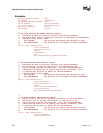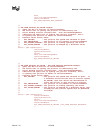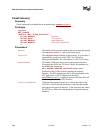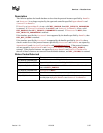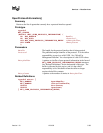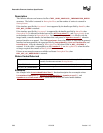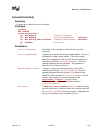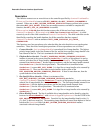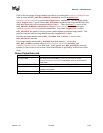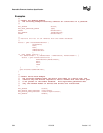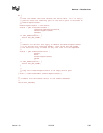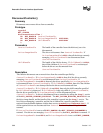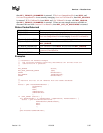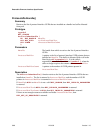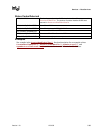
Extensible Firmware Interface Specification
5-62 12/01/02 Version 1.10
Description
This function connects one or more drivers to the controller specified by ControllerHandle.
If ControllerHandle is not a valid EFI_HANDLE,thenEFI_INVALID_PARAMETER is
returned. If there are no EFI_DRIVER_BINDING_PROTOCOL instances present in the system,
then return EFI_NOT_FOUND. If there are not enough resources available to complete this
function, then EFI_OUT_OF_RESOURCES is returned.
If Recursive is FALSE, then this function returns after all drivers have been connected to
ControllerHandle.IfRecursive is TRUE,thenConnectController() is called
recursively on all of the child controllers of ControllerHandle. The child controllers can be
identified by searching the handle database for all the controllers that have opened
ControllerHandle with an attribute of EFI_OPEN_PROTOCOL_BY_CHILD_
CONTROLLER.
This functions uses four precedence rules when deciding the order that drivers are tested against
controllers. These four rules from highest precedence to lowest precedence are as follows:
1. Context Override : DriverImageHandle is an ordered list of image handles. The highest
priority image handle is the first element of the list, and the lowest priority image handle is the
last element of the list. The list is terminated with a NULL image handle.
2. Platform Driver Override : If an EFI_PLATFORM_DRIVER_OVERRIDE_PROTOCOL
instance is present in the system, then the GetDriver()
service of this protocol is used to
retrieve an ordered list of image handles for ControllerHandle. The first image handle
returned from GetDriver() has the highest precedence, and the last image handle returned
from GetDriver() has the lowest precedence. The ordered list is terminated when
GetDriver() returns EFI_NOT_FOUND. It is legal for no image handles to be returned by
GetDriver(). There can be at most a single instance in the system of the
EFI_PLATFORM_DRIVER_OVERRIDE_PROTOCOL. If there is more than one, then the
system behavior is not deterministic.
3. Bus Specific Driver Override : If there is an instance of the
EFI_BUS_SPECIFIC_DRIVER_OVERRIDE_PROTOCOL attached to
ControllerHandle, then the GetDriver()
service of this protocol is used to retrieve an
ordered list of image handle for ControllerHandle. The first image handle returned from
GetDriver() has the highest precedence, and the last image handle returned from
GetDriver() has the lowest precedence. The ordered list is terminated when
GetDriver() returns EFI_NOT_FOUND. It is legal for no image handles to be returned by
GetDriver().
4. Driver Binding Search : The list of available driver image handles can be found by using the
boot service LocateHandle()
with a SearchType of ByProtocol for the GUID of the
EFI_DRIVER_BINDING_PROTOCOL. From this list, the image handles found in rules (1),
(2), and (3) above are removed. The remaining image handles are sorted from highest to lowest
basedontheVersion field of the EFI_DRIVER_BINDING_PROTOCOL instance
associated with each image handle.



